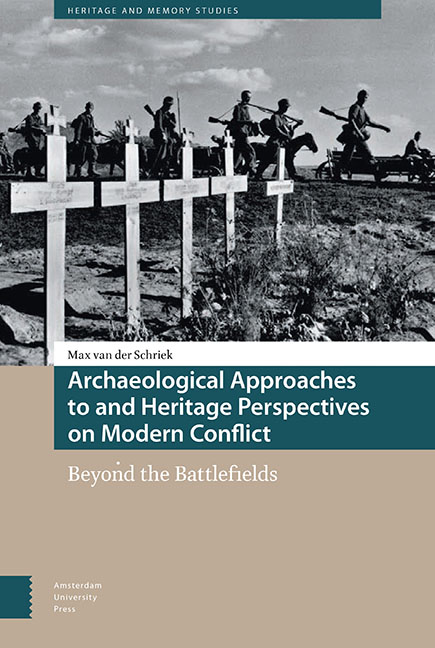Book contents
- Frontmatter
- Dedication
- Contents
- List of figures
- Acknowledgements
- 1 Introduction
- 2 Conflict archaeology
- 3 Landscape biographies of commemoration
- 4 Status quaestionis of conflict archaeology
- 5 Scientific and societal importance
- 6 The application of LiDAR-based DEMs
- 7 Summary and final debate
- Synopsis
- Appendix: WWII-related archaeological researches in the Netherlands (1984-2017)
- Bibliography
- Index
4 - Status quaestionis of conflict archaeology
Published online by Cambridge University Press: 27 April 2022
- Frontmatter
- Dedication
- Contents
- List of figures
- Acknowledgements
- 1 Introduction
- 2 Conflict archaeology
- 3 Landscape biographies of commemoration
- 4 Status quaestionis of conflict archaeology
- 5 Scientific and societal importance
- 6 The application of LiDAR-based DEMs
- 7 Summary and final debate
- Synopsis
- Appendix: WWII-related archaeological researches in the Netherlands (1984-2017)
- Bibliography
- Index
Summary
Abstract
In this chapter, the state of the field in the Netherlands is compared with that in other countries. This chapter has a descriptive character with a strong archaeological focus to reflect on international developments. How did conflict archaeology develop? What are the similarities and differences in approach and the narratives created in the various countries? For a set of relevant countries, namely the United Kingdom, Belgium (Flanders), France, Germany, Poland and the Netherlands, some of the most representative excavations have been selected for this chapter. Several recurring themes can be noticed, including the archaeology of (historic) battlefields, the archaeology of camps, aviation archaeology, finding the famous and the involvement of the wider public.
Keywords: archaeology of (historic) battlefields, archaeology of camps, aviation archaeology, finding the fallen, community engagement
In the highly current and dynamic field of conflict archaeology, a topical review of the available and ever growing literature on the subject can never be complete. For a set of relevant countries – namely, the United Kingdom, Belgium, France, Germany, Poland and the Netherlands – some of the most representative excavations have been selected for this chapter. This chapter delves into the following research questions: which excavations have led to new insights? Which new techniques for researching conflict sites and finding casualties of war have been developed? Did these studies contribute to wider research agendas on memory and heritage? Several recurring themes can be noticed, including the archaeology of battlefields, the archaeology of camps, aviation archaeology, finding the famous and the involvement of the wider public. Not so long ago, legacies of war and conflict would have been ignored by most archaeologists. What are the motives for the archaeological investigation of the remains of a violent past today? What are the similarities and differences between the countries discussed? How did these conflict-archaeological studies in the relevant countries impact the Netherlands? And, more importantly, to what extent can the Netherlands benefit from techniques developed abroad?
In general, each paragraph describes the most prominent examples of conflict archaeology in the various countries in chronological order. When several studies coincide, they are presented in the chronological order of the conflicts in question: sites of the Thirty Years War are discussed before those of the Napoleonic era or WWI, for example.
- Type
- Chapter
- Information
- Archaeological Approaches to and Heritage Perspectives on Modern ConflictBeyond the Battlefields, pp. 109 - 172Publisher: Amsterdam University PressPrint publication year: 2022

